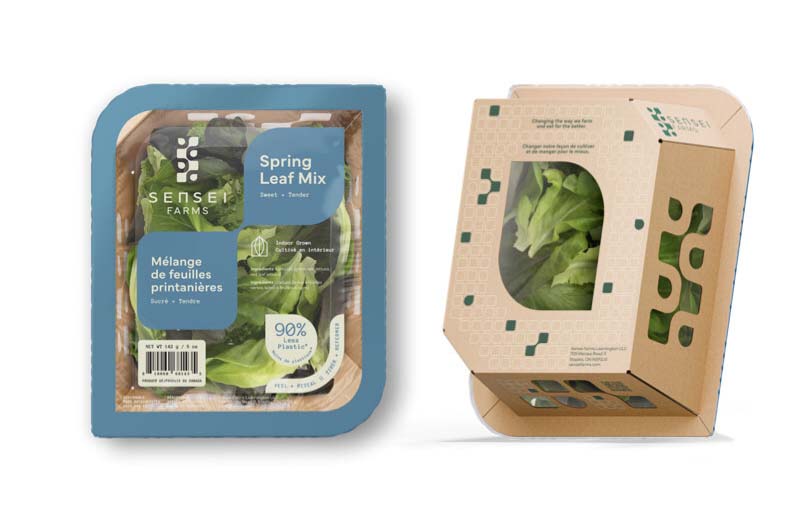Sensei Farms is introducing new packaging across its line of leafy greens and salad mixes, marking the indoor-grown produce brand’s next step toward a more sustainable future for the food supply.
The new design offers the same functional and food safety features retailers and consumers expect from conventional plastic clamshells, but in an eco-friendly form.
“From seed to shelf, we strive for innovation at every stage of our products,” said Jessica Vasisht, SVP of sales and marketing. “This focus allowed us to create a better, more impactful package that embodies the superior quality of our produce, without compromise.”
The proprietary design achieves a 90 percent reduction in plastic compared to the brand’s previous clamshell (by weight). The package features 360 degrees of product visibility thanks to the paperboard tray’s see-through base and branded side windows. Perforated panels allow the tray to be easily broken down, while a removable liner keeps the paperboard clean for recycling.
A “peel and reseal” closure helps keep the product fresh and provides convenient storage. The design fits into existing retail displays and stands out beside other plastic alternatives.
[RELATED: Driving Produce Sales As Parents Prepare For 2024-25 School Year]
Sensei Farms is delivering all these features and benefits without passing on added costs to retailers and consumers.
“Eco-friendly solutions often come with a premium on price, so we knew that barrier to adoption had to be removed,” Vasisht said. “This is a significant leap forward for our category and just the beginning of what Sensei Farms has planned.”
Product varieties featuring the new packaging are available at select Albertsons locations throughout the U.S. Mid-Atlantic region (Acme and Safeway store banners) and major grocers across the Hawaiian Islands beginning mid-third quarter of this year.
Santa Monica, California-based Sensei Farms operates two commercial greenhouse farms, including its flagship farm on the Hawaiian island of Lāna’i and a 30-acre farm in Ontario, Canada, with a combined capacity to grow more than 15.5 million pounds of fresh produce annually, including an assortment of leafy greens and other vine-grown fruits and vegetables.

